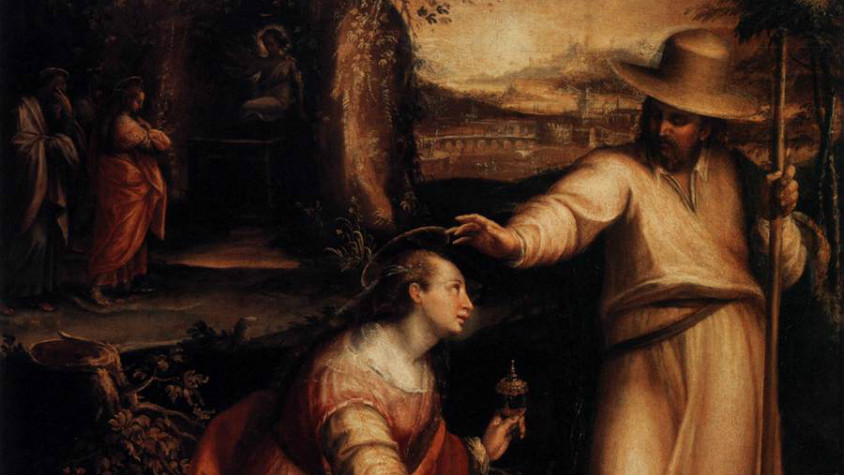Resurrecting Our Gods in Our Creations
Lincoln Cannon
31 August 2016

Four weeks ago, Spencer (my oldest son) left home to serve as a missionary of The Church of Jesus Christ of Latter-day Saints for two years in Montreal, Canada. The rest of my family and I miss him, and we also support him. Dorothee (my wife) and I served as missionaries of the LDS Church a couple decades ago, in France. That’s where we first met, and we both value the practical and spiritual education that we gained from the experience, as well as the relationships we developed with many others.
Today I received a kind letter from Spencer, in which he referenced a passage of scripture from the fifth chapter of John in the New Testament. It inspired some thoughts that I share below. As context for them, keep in mind that theological language often carries multiple levels of meaning, intentionally or even unintentionally. And in this case, it’s intentional even if ambiguous. Since his departure, I’ve been meaning to share some thoughts about it. This is what I’ve got in me for now.
“Then answered Jesus and said unto them, Verily, verily, I say unto you, The Son can do nothing of himself, but what he seeth the Father do: for what things soever he doeth, these also doeth the Son likewise.” (John 5: 19)
Joseph Smith used this scripture as a Biblical justification for his teaching that God wasn’t always God, but had lived and died as a mortal before progressing to become God. To see why, consider the verses that follow:
“For the Father loveth the Son, and sheweth him all things that himself doeth: and he will shew him greater works than these, that ye may marvel. For as the Father raiseth up the dead, and quickeneth them; even so the Son quickeneth whom he will. For the Father judgeth no man, but hath committed all judgment unto the Son: That all men should honour the Son, even as they honour the Father. He that honoureth not the Son honoureth not the Father which hath sent him. Verily, verily, I say unto you, He that heareth my word, and believeth on him that sent me, hath everlasting life, and shall not come into condemnation; but is passed from death unto life. Verily, verily, I say unto you, The hour is coming, and now is, when the dead shall hear the voice of the Son of God: and they that hear shall live. For as the Father hath life in himself; so hath he given to the Son to have life in himself; And hath given him authority to execute judgment also, because he is the Son of man. Marvel not at this: for the hour is coming, in the which all that are in the graves shall hear his voice, And shall come forth; they that have done good, unto the resurrection of life; and they that have done evil, unto the resurrection of damnation.” (John 5: 20-29)
Consider also a related passage from later in the Gospel of John:
“Therefore doth my Father love me, because I lay down my life, that I might take it again. No man taketh it from me, but I lay it down of myself. I have power to lay it down, and I have power to take it again. This commandment have I received of my Father.” (John 10: 17-18)
Note in the first passage where Jesus says, “For as the Father hath life in himself; so hath he given to the Son to have life in himself.” And note in the second passage where Jesus says: “I lay down my life, that I might take it again.” Now take a look at these words from Joseph’s last general conference sermon, a few months before he was killed:
“What did Jesus say? (Mark it, Elder Rigdon!) The Scriptures inform us that Jesus said, As the Father hath power in Himself, even so hath the Son power – to do what? Why, what the Father did. The answer is obvious – in a manner to lay down His body and take it up again. Jesus, what are you going to do? To lay down my life as my Father did, and take it up again. Do we believe it? If you do not believe it, you do not believe the Bible. The Scriptures say it, and I defy all the learning and wisdom and all the combined powers of earth and hell together to refute it. Here, then, is eternal life – to know the only wise and true God; and you have got to learn how to be gods yourselves, and to be kings and priests to God, the same as all gods have done before you, namely, by going from one small degree to another, and from a small capacity to a great one; from grace to grace, from exaltation to exaltation, until you attain to the resurrection of the dead, and are able to dwell in everlasting burnings, and to sit in glory, as do those who sit enthroned in everlasting power.” (Joseph Smith)
Joseph describes the progression as “going from one small degree to another, and from a small capacity to a great one; from grace to grace, from exaltation to exaltation.” And he describes the ultimate achievement to be when “you attain to the resurrection of the dead.”
Some people have interpreted that to mean that the ultimate achievement is when someone else resurrects you. But of course that doesn’t make sense as the ultimate achievement of Godhood. Joseph meant that the ultimate achievement is gaining the ability to resurrect the dead, including the ability to resurrect one’s self. He made that clear when, referring to John 5, he explained that the Son has power like the Father has power “in himself”; and when, referring to John 10, he explained that the Son has power “to lay down his body and take it up again.”
Joseph’s implicit reasoning is that if the Son can do only what he sees the Father do, and if the Son can die and resurrect himself, then the Father must have died and resurrected himself. The Bible says it. If you don’t believe it, you don’t believe the Bible. :)
Now the idea of resurrecting one’s self is strange. How does the Son resurrect himself while dead? I think we can get a better idea about how to interpret this if we continue reading and consider the next verse:
“I can of mine own self do nothing: as I hear, I judge: and my judgment is just; because I seek not mine own will, but the will of the Father which hath sent me.” (John 5: 30)
This may seem like a contradiction. Does the Son have power to resurrect himself or not? In John 5, Jesus says the the Son has “life in himself.” And in John 10, Jesus says he has “power to take it again.” Yet he also says, “I can of mine own self do nothing.” So which is it, Jesus? An answer, I think, may come from considering Jesus’ words later in the Gospel of John:
“Neither pray I for these alone, but for them also which shall believe on me through their word; That they all may be one; as thou, Father, art in me, and I in thee, that they also may be one in us: that the world may believe that thou hast sent me. And the glory which thou gavest me I have given them; that they may be one, even as we are one: I in them, and thou in me, that they may be made perfect in one …” (John 17: 20-23)
In my opinion, no passage of the Bible does a better job of describing what Christians commonly call the “Atonement of Christ” than this one does. Jesus’ goal, and the point of his Gospel, as portrayed here and elsewhere, is to unite God and humanity in love, taking that union even so far as to break down the category distinction between God and humanity. Jesus prays that we, with him, may become one in the glory of God. Paul echoes this message in his epistle to the Romans:
“The Spirit itself beareth witness with our spirit, that we are the children of God: And if children, then heirs; heirs of God, and joint-heirs with Christ; if so be that we suffer with him, that we may be also glorified together.” (Romans 8: 16-17)
And what is it to be glorified together as joint-heirs of God with Christ? It’s to become God, “the same as all gods have done before you,” to quote Joseph Smith. For whatever reason, many Christians today are often offended by this idea. There’s some irony in that, of course, as the Bible says the Jews were also often offended by Jesus’ suggestion that he (and his disciples with him) should become God. In fact, the passage of scripture we began with is itself an example of Jesus doubling-down on his claim of becoming God after offending some of his fellow Jews with the idea. Take a look at the verses just before the passage we began with:
“Jesus answered them, My Father worketh hitherto, and I work. Therefore the Jews sought the more to kill him, because he not only had broken the sabbath, but said also that God was his Father, making himself equal with God.” (John 4: 17-18)
So as good disciples of Jesus should, let’s make ourselves equal with God. Let’s recognize God not as a distinct category from humanity, but rather as an extension and negation of humanity. Let’s recognize God as Superhumanity. And let’s recognize ourselves, all of us together as one with Jesus, as Potential Superhumanity that comes from humanity, which in turn comes from Superhumanity. That’s Jesus’ example. That’s Jesus’ invitation. And if we apply this understanding to the passage of scripture where Jesus seems to be contradicting himself about having and not having power to resurrect himself, maybe we can make more sense of it. Here’s the passage again, with a twist. This time, I’ll switch out a few words so, as Nephi puts it in the Book of Mormon, to “liken all scriptures unto us, that it might be for our profit and learning.”
“For [Superhumanity] loveth [Potential Superhumanity], and sheweth [Potential Superhumanity] all things that [Superhumanity] doeth: and [Superhumanity] will shew [Potential Superhumanity] greater works than these, that ye may marvel [which makes sense only if you are part of Potential Superhumanity]. For as [Superhumanity] raiseth up the dead, and quickeneth them; even so [Potential Superhumanity] quickeneth whom [they] will. For [Superhumanity] judgeth [not humanity], but hath committed all judgment unto [Potential Superhumanity]: That all [humanity] should honour [Potential Superhumanity], even as they honour [Superhumanity]. He that honoureth not [Potential Superhumanity] honoureth not [Superhumanity] which hath sent [them]. Verily, verily, I say unto you, He that heareth my word, and believeth on [them] that sent me, hath everlasting life, and shall not come into condemnation; but is passed from death unto life. Verily, verily, I say unto you, The hour is coming, and now is, when the dead shall hear the voice of [Potential Superhumanity that comes from] God: and they that hear shall live. For as [Superhumanity] hath life in [themselves]; so hath [they] given to [Potential Superhumanity] to have life in [themselves]; And hath given [them] authority to execute judgment also, because [they are Potential Superhumanity that comes from humanity]. Marvel not at this: for the hour is coming, in the which all that are in the graves shall hear [their] voice, And shall come forth; they that have done good, unto the resurrection of life; and they that have done evil, unto the resurrection of damnation. I can of mine own self do nothing: as I hear, I judge: and my judgment is just; because I seek not mine own will, but the will of [Superhumanity] which hath sent me.”
By this interpretation, the power that Jesus claims resides not in himself exclusively, but rather in himself inclusively, as part of his unity with others, both Superhumanity and Potential Superhumanity, converging. Their power is his power. His power is their power. Together, by the grace and following the precedent of others before them, and yet also by their own volition, they have power to resurrect themselves interdependently.
The scriptures don’t say Jesus, alone, did or will do all the work. To the contrary, the scriptures portray Jesus as working with others, and inviting yet others to work with them. Jesus appeals to the power of his Father and he also commands his disciples to “raise the dead” (Matthew 10: 8). Together as one in Christ, we have power to lay down our lives and take them up again. As Jesus puts it, “He that heareth my word, and believeth on him that sent me, hath everlasting life, and shall not come into condemnation; but is passed from death unto life.”
Joseph Smith saw in such potential the ultimate achievement of Godhood. After all, it’s an expression of radical creation, transforming worlds of experience from life to death and back again. And perhaps more importantly, it’s an expression of radical compassion, valuing those worlds of experience enough to remain true to them, even through suffering and death, trusting steadfastly in their redemption – revering them as always ultimately worthy of redemption.
We can also find in Jesus’ words another message, not so literal, but perhaps even more important in its persistent practical applicability to our daily lives. God always has been and is at least a posthuman projection, an extension and negation of human virtues and vices. Without being God (yet, or perhaps ever in any final way), projection is the best we can do. And yet by aspiring beyond ourselves, looking to our parents and ancestors for inspiration and projecting their words and deeds beyond them into our own potential, looking at ourselves and aspiring beyond past words and deeds into that which transcends us, we begin to transform. And if we choose those projections wisely, recognizing that our present choices shape our future capacities to make more choices, in a feedback loop, our transformation becomes increasingly intentional and creative. And as we become filled with such power, I wager most of us will find that its maintenance and perpetuation increasingly depends on our mutual consent to use it with compassion. Power without compassion destroys, both others and ultimately itself.
As Jesus says, “I have power,” but “I can of mine own self do nothing.” Such is the case for all inter-networked reciprocal contingencies. Such is the case for all created creators, for all Gods of Gods, that would live to love truly and cultivate their creations into genuine creators beyond themselves. Such is the case for all parents and children.


